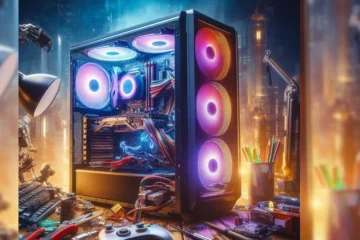Gaming has evolved into a serious pastime, and high-end gaming laptops are the vehicle that powers this evolution. As the demand for immersive gaming experiences continues to surge, the market is flooded with gaming laptops boasting powerful hardware and impressive features. In this article, we’ll dive into the world of high-end gaming laptops, compare their key components, and help you make an informed choice.
The Essentials of a High-End Gaming Laptop
1. Powerful Processors
Every gaming laptop’s CPU is its core component. A high-end gaming laptop demands a processor that can handle the most demanding games with ease. Processors from Intel and AMD are popular choices for gaming laptops.
2. Graphics Powerhouse
The graphics card, often referred to as the GPU (Graphics Processing Unit), is the cornerstone of gaming performance. Leading manufacturers like NVIDIA and AMD offer GPUs capable of rendering breathtaking visuals.
3. Ample RAM of Gaming laptops
Gaming requires a lot of memory to ensure smooth gameplay. Look for laptops with at least 16GB of RAM to handle the latest game titles without a hitch.
4. Fast and Capacious Storage
Traditional hard drives are being rapidly replaced by lightning-fast SSDs (Solid State Drives). SSDs enhance loading times and overall system responsiveness, a must for high-end gaming.
5. Advanced Cooling Systems
Powerful components generate heat, and efficient cooling is essential to prevent overheating. Gaming laptops often feature advanced cooling systems to keep the temperature in check during extended gaming sessions.
6. Display Matters
A high-quality display is crucial for a gaming laptop. Opt for laptops with a high refresh rate and low response time for an immersive gaming experience.
Key Considerations
1. Budget
Determine how much you’re willing to invest in your gaming laptop. High-end models can be pricier, but they offer top-tier performance.
2. Portability vs. Performance
Consider whether you prioritize portability or raw gaming power. Thinner, lighter laptops sacrifice some performance for convenience.
3. Game Compatibility
Ensure that your laptop’s hardware is compatible with the games you intend to play. Some games have specific requirements for smooth gameplay.
4. Battery Life
Gaming laptops have a bad reputation for rapidly depleting batteries. Look for models with decent battery life if you plan to game on the go.
Top Picks: A Comparison
Let’s compare a few high-end gaming laptops that have received rave reviews from gamers and tech experts alike:
1. ASUS ROG Zephyrus G14
Processor: AMD Ryzen 9
GPU: NVIDIA GeForce RTX 3060
RAM: 16GB
Storage: 1TB SSD
Display: 14-inch, 144Hz refresh rate
2. Alienware m15 R5
Processor: AMD Ryzen 9
GPU: NVIDIA GeForce RTX 3070
RAM: 32GB
Storage: 1TB SSD
Display: 15.6-inch, 165Hz refresh rate
3. Razer Blade 15
Processor: Intel Core i7
GPU: NVIDIA GeForce RTX 3080
RAM: 16GB
Storage: 512GB SSD
Display: 15.6-inch, 300Hz refresh rate
Conclusion
The world of high-end gaming laptops offers a plethora of options, each with its unique blend of power, portability, and price. It’s essential to assess your gaming needs, budget, and game compatibility to make the right choice. Whether you go for an ASUS, Alienware, or Razer, the future of gaming is in your hands.
FAQs
What’s the difference between gaming laptops and regular laptops?
Gaming laptops are optimized for high-performance gaming, with powerful processors, advanced GPUs, and gaming-focused features.
Are gaming laptops suitable for tasks other than gaming?
Yes, gaming laptops can handle a wide range of tasks, including content creation and productivity work.
How often should I upgrade my gaming laptop?
The frequency of upgrades depends on your specific needs and budget. Generally, high-end gaming laptops offer long-lasting performance.
Do gaming laptops overheat during extended gaming sessions?
Many gaming laptops come equipped with advanced cooling systems to prevent overheating, but extended gaming may still require external cooling solutions.
Can I connect a gaming laptop to an external monitor for better gaming experiences?
Yes, gaming laptops often support external monitor connections, allowing you to enjoy larger displays and higher refresh rates.


